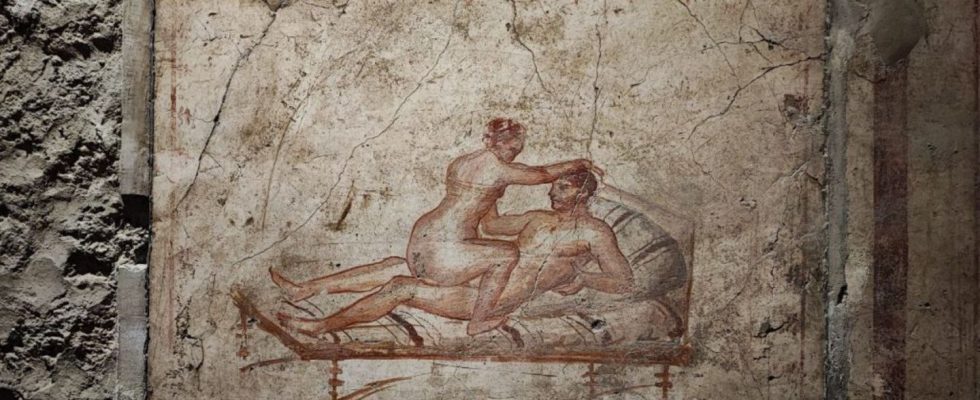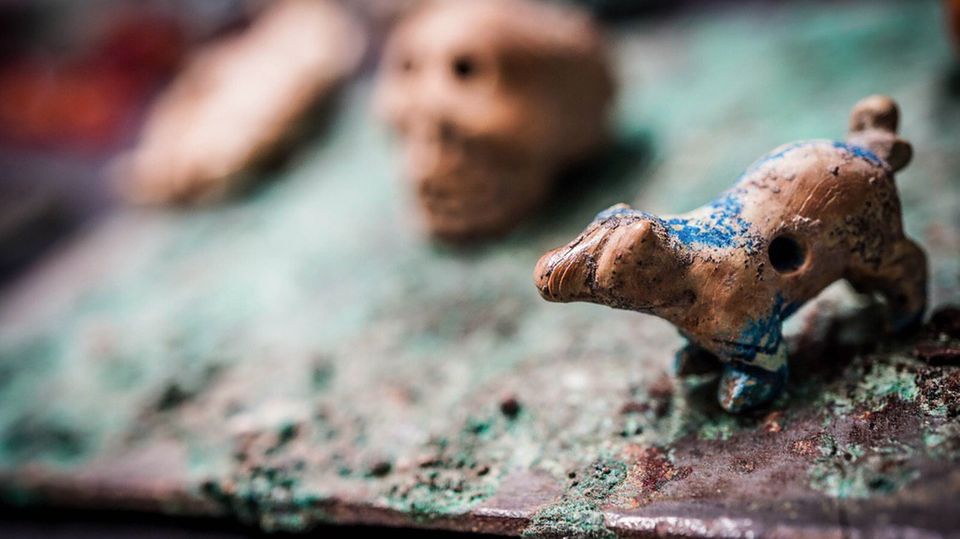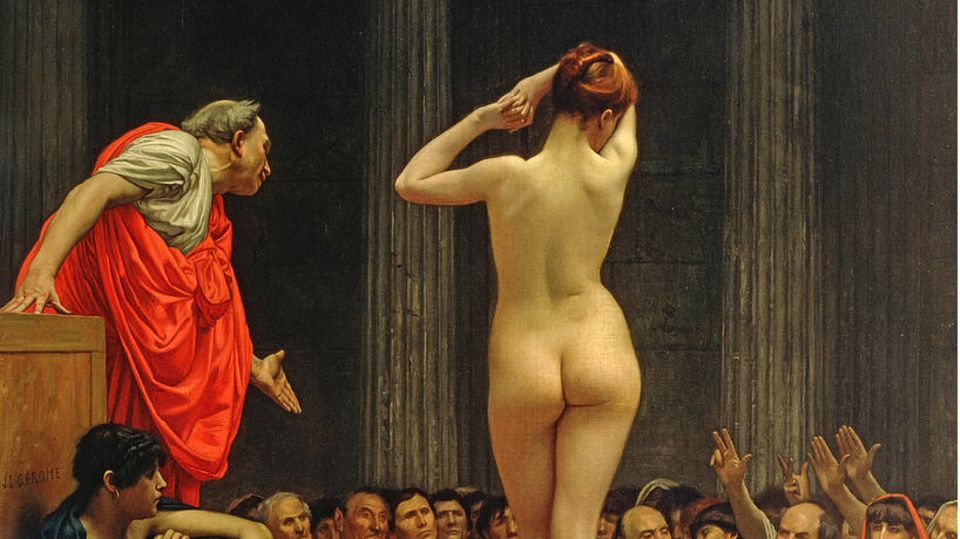Roman Empire
Graffiti from Pompeii: Villa advertises a slave’s sex services
Erotic fresco from the Casa dei Vettii
© Silvia Vacca/Archaeological Park of Pompeii
The girl Eutychis could be had for two copper coins. Behind the kitchen she had to serve her customers in a chamber. Probably not on your own account. The mini brothel was supposed to make their rich owners even wealthier.
For 20 years the Casa dei Vettii was in Pompeii restored, since this year it can be visited again. Earlier restorations had done more harm than good to the numerous frescoes of the wealthy merchant house. The house belonged to Aulus Vettius Conviva and Aulus Vettius Restitutus, probably brothers. Freed slaves who became very wealthy trading wine.
Freedmen were a moment of great social mobility in the Empire. Coming from the very bottom, they were able to rise very far, at least economically. Normal slaves were ruthlessly “used up”. Burial sites on construction projects and on country estates show how young and battered the unfortunate died. Even as slaves, freedmen usually had a close relationship with their owners, which continued even after the act of release. So also Conviva and Restitutus, who took the name of their former master Aulus Vettius. An extreme example is Acne, slave and mistress of Emperor Nero. As a free woman, she owned large estates. She was so powerful and courageous that she dared to defy the senate and arrange the funeral for the dead and outlawed emperor. However, freedmen were also considered the strictest and worst masters of their slaves. From their own experience, they knew all the tricks and tricks that slaves used to make their lives bearable.
Unmoral offer
The rich brothers’ house hides a dark secret. At least one can assume that. There is graffiti scratched into the left wall of the entrance hall. “Eutychis, a Greek girl with sweet ways, 2 aces.” Eutychis Graeca a(ssibus) II moribus bellis. Here the sexual services of a slave were offered for two copper coins. For the price you could also get two glasses of wine or a piece of bread.
Romans little bashful
It is well known that the city was extremely liberal compared to today’s conditions. The large brothel is well known for its pornographic scenes. Penises were carved on the street stones as signposts. In the TV series “Domina” a similar brothel is depicted very realistically. In addition, there was graffiti all over the city with references to prostitution. The pre-Christian Romans were not bashful anyway. Most of the salacious sexual jokes and innuendos circulating today have their origins in the sex-heavy humor of the Romans. An example of this from the city on Vesuvius: “Cry, you girls. My penis has given up on you. Now it penetrates the buttocks of men. Goodbye, wonderful femininity!”
The Roman poet Horace extolled the virtues of prostitution. The “airy” clothes allow a man to judge beforehand what he is buying. The costs are reasonable and, moreover, he can call a prostitute whatever he likes, thus satisfying his sexual fantasies. It didn’t depend on the wishes of the woman, because the prostitutes were mostly slaves. Horace also recommended a pragmatic approach to a morning stiff. “If your thing is stiff and there’s a maid or little boy from the household nearby and you know you can launch an attack in an instant, why burst with tension?”
Lawless Slaves
Slaves were disenfranchised. In most houses in Pompeii there weren’t even rooms for them, they had to sleep in the corridors and in the basement. The slave quarters on country estates resembled prisons. The owners also controlled sex between the slaves. To reward and also to produce new slaves. Shackles and dungeons were found in Pompeii. A woman whose remains were found in the Temple of Apollo was a runaway slave wearing a collar that read, “This is a cheating whore. Catch her for she fled Bulla Regia.” But alongside these moments there are also testimonies of love between masters and slaves or former slaves in Pompeii. The best known is the woman who was found with a circlet inscribed “From a master to his slave girl.” The couple died together while fleeing Mount Vesuvius on the road. The value of a woman’s jewelry far exceeded the wealth of an ordinary Roman.
Today we know little more about Eutychis than this graffiti. But there is much to suggest that she was one of the unfortunate slave girls. And she probably didn’t earn a few extra sesterces on her own. Then the advertising in the entrance hall of the owners would be very bold. The woman’s name was probably not even “Eutychis” – the word means happy and would be a typical “working name” for a prostitute – like “Happy” or “Lucky” today. Another slave in the house of the Vettii was called “Eros” – desire. The graffito for him was scratched out and read “Eros likes to be sexually passive”. The “sweet ways” that the graffiti awarded the girl was a common accessory for sexual services. The words may simply have promised a “good time,” but it may be sexual code. The exact meaning is unknown today.
Hidden Sex Chamber
In the other rooms of the house there are murals with mythological scenes. The brothers do not appreciate idylls on the wall, but violent erotic motifs. As historian Severy-Hoven puts it: “When the owner selected these images of eroticized torture, he inscribed his own power to punish or enjoy on its walls.” The former slaves were now masters in every respect and they seemed to enjoy it. In addition, there was a hidden small porn room in the merchants’ house, decorated with erotic motifs. The chamber was hidden and could only be accessed from the kitchen. It could have been a kind of private brothel where Eutychis had to prostitute himself. A total of six such rooms have been found in Pompeii.
The connections as described here sound plausible, but one cannot be sure. Imagination has to fill in too many gaps for that. It is also quite possible that the owners of the house only had a penchant for ostentatious subjects with erotic overtones. And the girl Eutychis must not have lived in the house either. It may just be a scribbled invective.
Sources: Aeon; Gender & History





